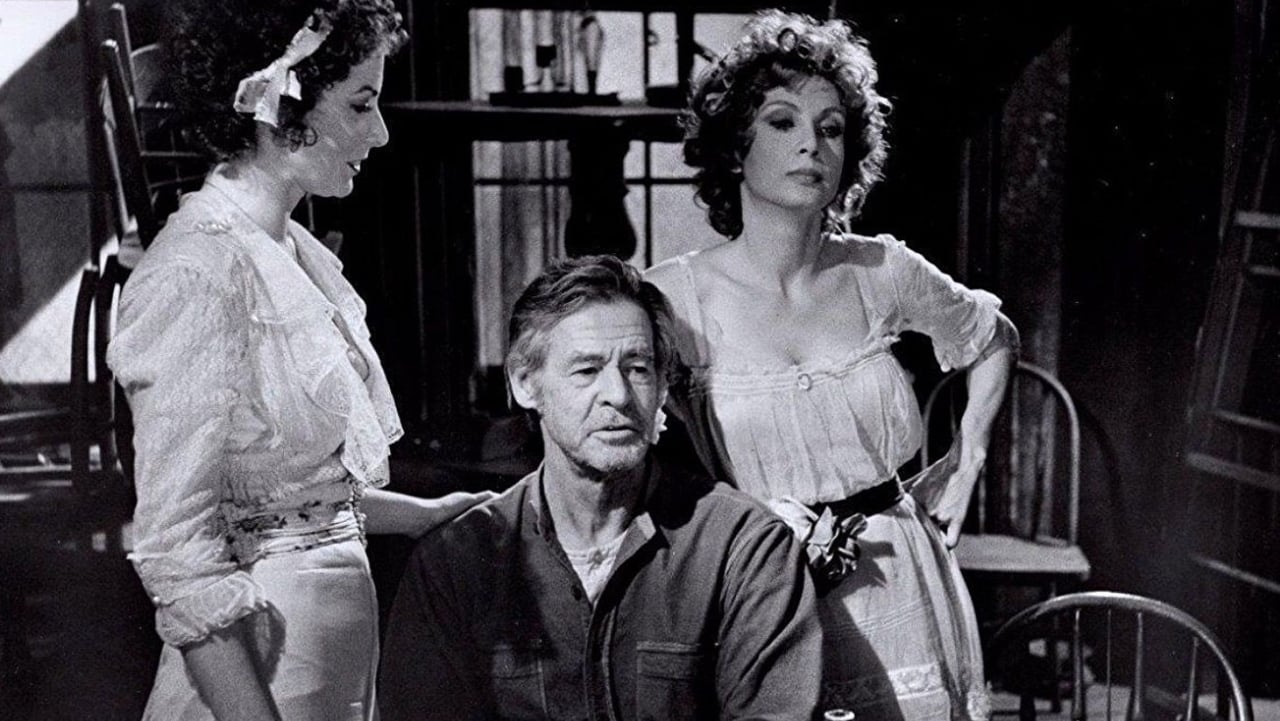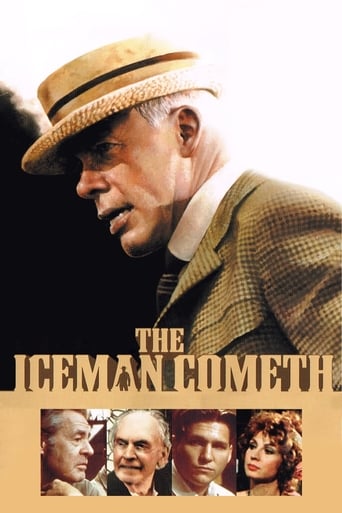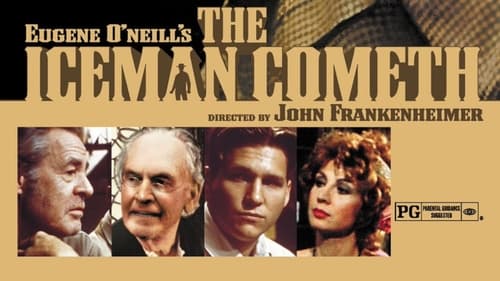




Load of rubbish!!
It's a mild crowd pleaser for people who are exhausted by blockbusters.
View MoreOk... Let's be honest. It cannot be the best movie but is quite enjoyable. The movie has the potential to develop a great plot for future movies
View MoreThis is a dark and sometimes deeply uncomfortable drama
View MoreOne reviewer opines that Jason Robards' Hickey is better than Lee Marvin's. I couldn't disagree more. I have DVD's of both versions and I believe Robards is playing Robards as much as he is playing Hickey. Also, Robards strains in The Iceman that you can see he is "acting." Marvin, on the other hand lets Hickey be Hickey. One other thing makes the Iceman Cometh with Marvin far superior is the supporting class. Robert Ryan, Bradford Dillman and Frederic March give magnificent, believable performances. I think Robards believed all the reviews that said he was the ultimate O'Neill actor. By way of contrast, see Robards in Long Days Journey Into the Night where he doesn't let his persona get in the way of his role. Also, in Long Day's Journey we have an ensemble play/movie that doesn't require Robards to strain to be the great O'Neill actor.
View MoreLee Marvin does his best here, but is just not in the same class as Jason Robards who is perfect for the role. There are other fine characters in the Marvin version which makes it definitely worth a look, however, nobody in the supporting cast does a bad job. Fredric March and Robert Ryan are truly spectacular in their roles and really steal the show from Lee Marvin. The Iceman Cometh is a great play, probably the best Eugene O'Neill ever wrote. If you haven't seen it, watch this, it's a cut above the average American film. But if you're planning on buying a copy, search for Jason Robard as Hickey. Lee Marvin's acting is too one dimensional to make this an excellent film.
View More"The Iceman Cometh" was part of American Film Theatre, an experiment by producer Ely Landau. The idea was for top-flight casts and creative talent to film classic plays. Then selected theaters would show one film a month, but only on two days (consecutive Tuesdays, if memory serves) before returning to their regular programs until the following month, when the next AFT release would be put up for two more days.The program was nothing if not high-tone and ambitious. Productions included Edward Albee's "A Delicate Balance" with Katharine Hepburn, Paul Scofield and Lee Remick; "Lost in the Stars," the Maxwell Anderson-Kurt Weill musical based on "Cry, the Beloved Country"; Eugene Ionesco's "Rhinoceros" with Zero Mostel and Gene Wilder; and Chekhov's "The Three Sisters" directed by Laurence Olivier. Unfortunately, the project as a whole was an unmitigated disaster. For one thing, most of the films were uninspired, some were mediocre, and a few were downright awful. But most of all, the whole idea flew in the face of motion picture economics: how could any movie (or live play, for that matter) possibly break even when it ran for only TWO DAYS? All things considered, it's a tribute to Landau's skill as a promoter that the AFT managed to limp through two "seasons," 1973-74 and 1974-75, before collapsing in a tangled heap of debts, lawsuits, and countersuits. But collapse it did, and the legal can-of-worms that it left, with the AFT's liabilities mixed with the rights of authors and their estates, is probably what keeps the films out of theatrical circulation and unavailable on video.In the case of most AFT productions, truth be told, that's no great loss. But "The Iceman Cometh" is head-and-shoulders above all the rest put together (I suspect Landau knew it, too: that's no doubt why he put his best foot forward by making it the premiere production). It is, in fact, a great movie -- a great play with a once-in-a-lifetime cast (it was Fredric March's last movie, and Robert Ryan died even before it came out) under the hand of a fine director (John Frankenheimer) who cut his teeth on live drama during the Golden Age of Television.Nobody connected with this film ever did better work -- not Ryan, who was brilliant and deserved a posthumous Oscar nomination for it; not March, one of Hollywood's greatest; none of the supporting cast; not even Jeff Bridges, who was only 23 and just at the beginning of his career (he once said that this was the film that made him realize he was serious about being an actor).A special case is Lee Marvin in the pivotal role of Hickey; he was much disparaged by critics at the time, but the tone was one ofhow-dare-this-B-movie-thug-lay-his-unclean-hands-on-a-role-that-belongs-now- and-forever-to-Jason-Robards. Meaning no disrespect, but Robards was hardly infallible; Lee Marvin never did anything as bad as Robards's Brutus in "Julius Caesar" (1970). An impartial viewing of Marvin in "The Iceman Cometh" shows he was entirely up to the role, even in the demanding, shattering 25-minute monologue where Hickey's self-loathing hypocrisy slips out against his will. I was lucky enough to see this film twice in a theater -- once on its premiere in November '73, and again in the spring of '75, when Landau tried (in vain) to recoup his losses by giving a general release to selected AFT films. I've never forgotten it, and there are moments as fresh in my mind as if I saw them yesterday: Robert Ryan's anguish when he snarls, "You think you'll get me to admit that to myself?" and Marvin replies, "But you just did admit it, didn't you?"; Jeff Bridges's tormented profile as he sits at the table with Ryan trying to sort out his life; Fredric March as the doddering saloon-keeper venturing outside for the first time in years; Lee Marvin's ironic little dance as he calls himself "a happy-go-lucky slob like me." All, and so much more, unforgettable.I am dismayed to read in another comment here that there seems to be a three-hour version of this film out there somewhere. This would be outrageous enough if the original version were readily available, but since the original is not, it's intolerable. Any cutting of this film (which already judiciously edits O'Neill's original text) can only be a mutilation. Accept no substitutes, and DO NOT watch this film, regardless of its length, if it is shown on TV with commercial breaks. See it ONLY in its 239-minute version, uninterrupted except for the two intermissions O'Neill intended (this was, by the way, the first movie with two intermissions) -- the cumulative power of the play demands it, and a movie this great deserves nothing less.
View MoreIn 1973 when the American Film Institute's repertoire played in selected U.S. city theaters, "The Iceman Cometh" was a series standout. The film retains its effectiveness today, due to O'Neill's insightful script, John Frankenheimer's excellent direction, and a fine cast, headed by Fredric March and Robert Ryan. We are fortunate to have so beautiful a production of this classic American play preserved on film.
View More